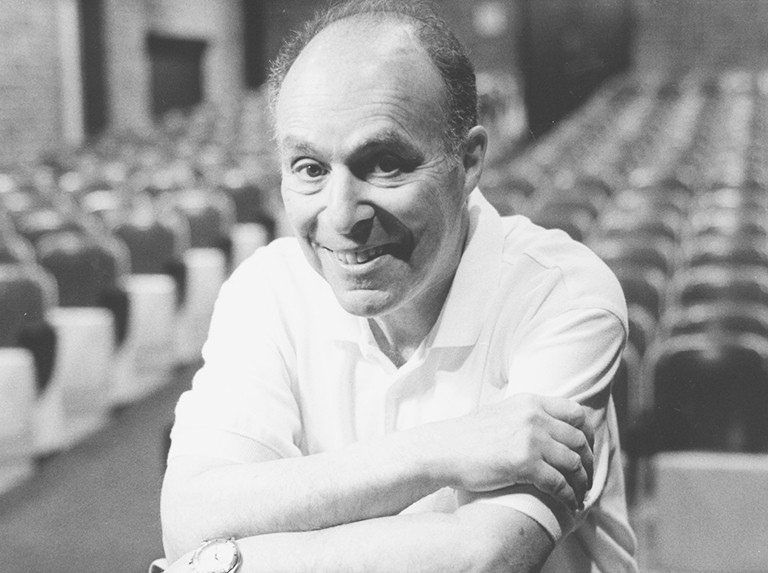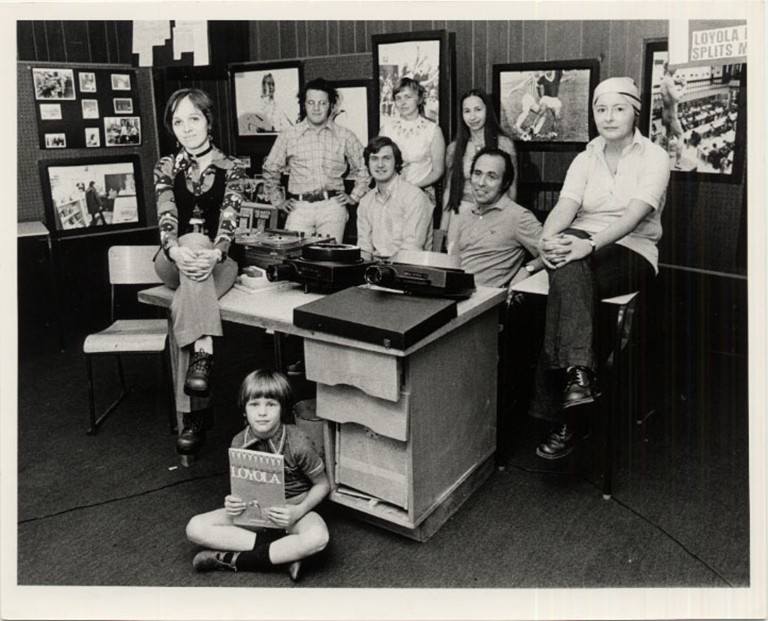Gerald ‘Gerry’ Gross (1930-2025): ‘Most of all, he loved his students’
 Dean Patrick Fleming: ‘Gerry taught so many of us so very much about theatre and about being human.’
Dean Patrick Fleming: ‘Gerry taught so many of us so very much about theatre and about being human.’
Gerry Gross — devoted husband and father, professor emeritus of theatre, founder of Concordia’s Fine Arts department (precursor to the Faculty), community leader and mentor — passed away on August 17, 2025.
A passion for teaching
Gross earned degrees from McGill, the Université de Montréal and Carnegie-Mellon University in Pittsburgh.
As a young man, he performed in and helped score McGill’s Red and White Revue — a vaudeville-style musical theatre tradition at the university that showcased some of Montreal’s greatest student talent for nearly sixty years.
Discovering he had a passion for teaching, he was hired as an English teacher at Loyola College in 1972. Soon after, he would be greatly responsible for establishing what is now known as Concordia’s Faculty of Fine Arts.
Members of Montreal’s theatre community remember him fondly, many of whom credit him as having an enduring impact on their careers.
“I will always remember Gerry Gross as a kind and generous man,” says former student Vittorio Rossi, BFA 85, playwright, actor, director and screenwriter. “He loved theatre, and he loved Concordia’s Theatre Department, which he helped to create.
“Most of all, he loved the students,” Rossi says.
 CEGEP Advisory Council members with Gerry Gross (second from right) and a young helper (sitting on the floor).
CEGEP Advisory Council members with Gerry Gross (second from right) and a young helper (sitting on the floor).
Integrating the arts
Employed by Loyola College just a year before it merged with Sir George Williams, Gross quickly moved into a role as a theatre instructor, tasked with establishing Concordia’s Fine Arts department. Composed of existing courses in art history, painting and communications, the fledgling department was initially divided into two areas: visual arts and performing arts.
Gross was appointed acting director of performing arts in 1975. However, he always lamented the division that resulted from program’s expansion. The once multidisciplinary department became a faculty of distinct disciplines: the present-day Faculty of Fine Arts.
"A lot of modern art integrates the arts," he noted in 2000. "The dancer who does a theatre piece doesn’t see herself as a dancer or a theatre performer."
Gross’s original vision resonates today with the upcoming opening of Concordia’s new School of Performance in Fall 2026; a return to a more integrated approach to the performing arts that Gross championed.
What’s past is prologue
Gross also stressed the importance of understanding the historical and sociocultural context that shapes all aspects of acting and directing. He extended this view to his own scholarly research, fascinated with Montreal’s theatrical history. His oft-cited studies on the career of Montreal-born scriptwriter, Reuben Ship, are one example.
“Gerry was a great storyteller,” says Shauna Janssen, associate dean of academic programs and pedagogy at Concordia. She recounts her time in Gross’s history of theatre class: “He taught me the importance of understanding the past in order to become a future theatre-maker.”
In the mid-‘90s, Gross encouraged Linda Hackett, who was developing a high school drama program, to include a historical background.
“He explained that many students who entered Concordia’s undergraduate theatre program had participated in school productions,” she notes. “But they had minimal training as actors and little knowledge of the historical, social and cultural context of any plays in which they had performed.”
Dean Patrick Flemming, professor at the National Theatre School and past artistic director of Geordie Theatre and Hudson Village Theatre, echoes these sentiments.
“When talking about directing, Gerry often asked, ‘What are the given circumstances?’ It was his way of grounding us in the reality of the situation we were exploring. Years later, I realized that Gerry was also teaching us to look at context — encouraging us to see and reflect on all the different points of view,” he says.
“He was smart, caring, fair and honest. Gerry taught so many of us so very much about theatre and about being human.”
Pointing the way
“Gerry was a wonderful teacher,” says Robert Reid, associate professor at Concordia’s Department of Theatre.
“As a student, he taught me that the greatest thing about theatre is that you can do anything you want, so long as you do it well,” he says.
“Later, when I sought teaching advice, he shared that he had come to realize that he ‘did too much’ in his classes, he said too much. With time, he learned to step back and let the students do more of the work, more of the thinking — that he was just there to guide them.”
Rossi credits Gross with giving him both the emotional and physical space to develop his practice.
“As a young man, I was looking for direction, for a way to make it through both as an actor and as a playwright. I’ll never forget Gerry telling us about the wonderful ‘black box of a space’ available to us at the Loyola Campus: the Chameleon Theatre. He encouraged us to make use of it, booking the space to present our work,” he says.
“That word of encouragement was music to my ears: I now had a place where I could show my new plays. And I did. Those presentations effectively began my professional career as a playwright.
“Gerry pointed the way, and I took it. I will be forever grateful for his contribution to my early career. Gerry Gross will always have a special place in my heart,” Rossi says.




